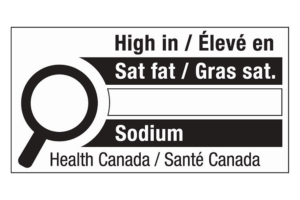
Canada’s Front of Package Label – The Solution to our Obesity Crisis?
Obesity is a global emergency. Worldwide, adult obesity has more than doubled since 1990, and adolescent obesity has quadrupled. Two alarming stats to consider:
- In 2022, 2.5B adults (18 and over) were overweight. Of these, 890M were living with obesity.
- Over 390M children and adolescents aged 5-19 years were overweight in 2022, including 160M who were living with obesity,[1]
Closer to home, a new study published in the Canadian Medical Association Journal confirms that obesity rates in Canada have surged since the onset of the pandemic, and now, one in three Canadian adults lives with obesity. [2] In addition, approximately 30% of Canadian children and youth aged 5-17 are considered overweight or obese. Childhood obesity rates have nearly tripled in the past 30 years [3] In response, the Federal Government of Canada is mandating a “Front of Package Label” to help consumers identify foods high in saturated fat, sugar, and sodium, commencing January 2026. This is part of Health Canada’s “Healthy Eating Strategy” to promote healthier food choices.

Note: In 2011, The Consumer Brands Association, and the Food Industry Association in the United States introduced a “Voluntary” Facts up Front Label.
What is the Definition of Obesity?
Obesity is a medical condition, considered by multiple organizations to be a disease, in which excess body fat has accumulated to such an extent that it can have negative effects on health. A Body Max Index (BMI) of 30 or more is classified as obesity[4].
What are the Causes of Obesity?
Overweight and obesity develop over time when consumers consume more calories than you use. Lack of physical activity, combined with high amounts of TV, computer, and other screen time, has been associated with high body mass index (BMI). Most adults are recommended to engage in 150 minutes of aerobic activity per week, while children should participate in 60 minutes of aerobic activity daily.
What is the Cost to Canada’s Health Care System Due to Obesity?
This past year, findings from Obesity Canada as part of their study, “Modelling the Cost of Inaction in Treating Obesity in Canada,” revealed: 1) The incremental annual cost to Canada’s healthcare system due to obesity was $5.9B, associated with 19M more physician visits, among other care and support needs. 2) Beyond direct healthcare implications, workplace productivity costs were more than three times higher, reaching an estimated $21.7B because of increased absenteeism and presenteeism, reduced productivity, and lower workforce participation.[5]
What Methods Have Other Countries Implemented to Address Obesity?
Some governments have launched initiatives to tackle specific factors believed to increase the risk of obesity, including:
- France: Tax the advertising budgets of food companies that do not encourage healthy eating.
- Hungary: Tax on pre-packaged food high in sugar and salt.
- England and Mexico: Tax on sugary drinks.
It’s worth noting that over 73 countries worldwide have implemented taxes on sugar-sweetened beverages. In the United States, several cities have implemented such taxes. To the dismay of the Heart and Stroke Foundation of Canada, Newfoundland and Labrador just eliminated its tax on sugary beverages. They are advocating for each province to implement a sugar sweetened beverage tax and utilize the proceeds to implement a guaranteed income program.
Are Government Initiatives Effective in Reducing Obesity?
While taxing unhealthy food could eventually reduce obesity, studies reveal that the effectiveness of such taxes is complex and may not be sufficient on their own to impact obesity rates significantly. In 2013, The Fraser Institute as part of their study “Taxing Unhealthy Foods won’t Reduce Obesity”, they concluded: “Overly simplistic solutions to obesity that vilify an industry or food product are bad public policy. The reality is that “junk food” taxes or “sugary drink” taxes are ineffective, blunt instruments that fail to recognize the complex and manifold causes of obesity. It’s time we put the idea of such taxes in their rightful place: the junk bin”.[6] Georgetown University’s McDonough School of Business just released a study on Front of Pack Labeling and its impact on obesity. They concluded:
“Front-of-Pack Warning Labels Don’t Lower Obesity Rates”.
“As part of their summation, “Yes, people may buy less of the packaged food items with warning labels. But often the effect is temporary or doesn’t look at their total diet and sadly, people are not getting any healthier. Obesity rates have continued their upward march around the world, even in countries that use the strictest warning labels and in parts of the world where other citizens suffer from malnutrition”.[7]
Food Distribution Guy’s Final Thoughts
Although obesity is a global challenge, Governments around the world tend to assign most of the blame on the shoulders of the food industry. Nothing could be further from the truth as there are many other causes to obesity, including but not limited to: 1. Genetics, 2. Stress Levels, and 3. Lack of physical activity. If the Federal Government of Canada were so concerned with obesity, they would pass the same initiative the US Government just passed, allowing citizens to claim their gym membership fees as a medical expense. Based on Georgetown University’s McDonough School of Business sentiments,
Health Canada’s Approach is a Band-Aid Solution.
Should Health Canada rescind this legislation? Yes! Will they? No! The Public sector can never admit when they are wrong. On a personal level, I have many concerns with this legislation, including:
- It is Mandatory, not Voluntary.
- I do not need to be micromanaged by the Public Sector on my eating habits.
- Nearly 80% of consumers use nutritional labels in their buying decisions.[8]
- We as a society have started accepting those for being overweight. Health Canada’s new packaging requirement may shame them for purchasing such a product.
- The legislation does not discuss the likely economic impacts, i.e. job losses, and / or the cost of the new label being passed down to consumers.
I leave you with this last sentiment:
Nothing Good Comes from Public Sector Involvement in the Private Sector!
[1] Obesity and Overweight, www.who.int, May 2025
[2] Canada Got Fatter Since the Pandemic. Pharma Noticed, www.torontosun.com, 2025
[3] Childhood Obesity, www.canada.ca
[4] Centers for Disease Control and Prevention
[5] Cost of Inaction in Treating Obesity, www.obesitycanada.ca, 2024
[6] Taxing Unhealthy Foods Won’t Reduce Obesity, www.fraserinstitute.org, 2013
[7] In Case You Missed It: Georgetown Study Finds Front-of-Package Warning Labels Don’t Lower Obesity Rates, www.consumerbrandsassociation.org, June 2025
[8] Charts of Note, www.ers.usda.gov, 2023





